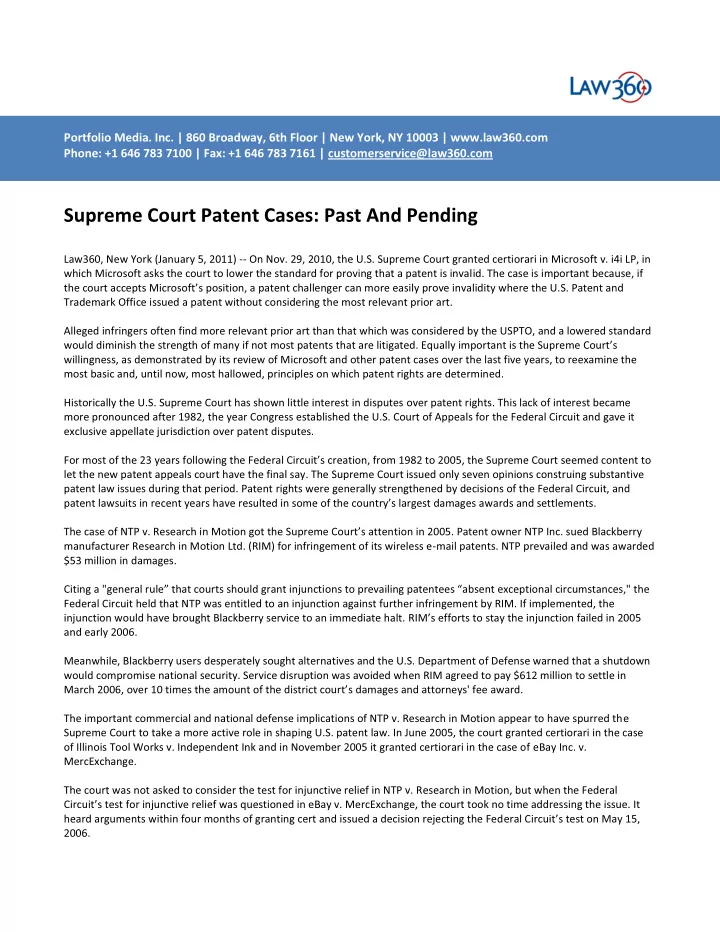

����������������������������������������������������������������������������������������������������������������������������� ����������������������������������������������������������������������������������������������������������������������� ��������������������������������������������������������������������������������������������������������������������� ����������������������������������������������������������������������������������������������������������������������������� Portfolio Media. Inc. | 860 Broadway, 6th Floor | New York, NY 10003 | www.law360.com Phone: +1 646 783 7100 | Fax: +1 646 783 7161 | customerservice@law360.com Supreme Court Patent Cases: Past And Pending Law360, New York (January 5, 2011) -- On Nov. 29, 2010, the U.S. Supreme Court granted certiorari in Microsoft v. i4i LP, in which Microsoft asks the court to lower the standard for proving that a patent is invalid. The case is important because, if Trademark Office issued a patent without considering the most relevant prior art. Alleged infringers often find more relevant prior art than that which was considered by the USPTO, and a lowered standard willingness, as demonstrated by its review of Microsoft and other patent cases over the last five years, to reexamine the most basic and, until now, most hallowed, principles on which patent rights are determined. Historically the U.S. Supreme Court has shown little interest in disputes over patent rights. This lack of interest became more pronounced after 1982, the year Congress established the U.S. Court of Appeals for the Federal Circuit and gave it exclusive appellate jurisdiction over patent disputes. For most of the 23 years follow ������������������������������������������������������������������������������������������� let the new patent appeals court have the final say. The Supreme Court issued only seven opinions construing substantive patent law issues during that period. Patent rights were generally strengthened by decisions of the Federal Circuit, and �������������������������������������������������������������������������������������������������������������� ������������������������������������������������������������������� tion in 2005. Patent owner NTP Inc. sued Blackberry manufacturer Research in Motion Ltd. (RIM) for infringement of its wireless e-mail patents. NTP prevailed and was awarded $53 million in damages. Federal Circuit held that NTP was entitled to an injunction against further infringement by RIM. If implemented, the injunction would have brought Blackberry service to an immediate halt. ���������������������������������������������������� and early 2006. Meanwhile, Blackberry users desperately sought alternatives and the U.S. Department of Defense warned that a shutdown would compromise national security. Service disruption was avoided when RIM agreed to pay $612 million to settle in ���������������������������������������������������������������������������������������������� The important commercial and national defense implications of NTP v. Research in Motion appear to have spurred the Supreme Court to take a more active role in shaping U.S. patent law. In June 2005, the court granted certiorari in the case of Illinois Tool Works v. Independent Ink and in November 2005 it granted certiorari in the case of eBay Inc. v. MercExchange. The court was not asked to consider the test for injunctive relief in NTP v. Research in Motion, but when the Federal heard arguments within four months of granting cert and issued a decision rejecting the Fed ������������������������������� 2006.
Recommend
More recommend